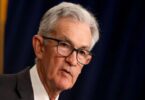BRUSSELS (AFP): The eurozone economy is contracting at its fastest rate in three years as a steep decline in manufacturing begins to spread to services, a key survey said Wednesday.
Data from the HCOB Flash Eurozone purchasing managers’ index (PMI) survey published by S&P Global fell to 47 in August from 48.6 in July. A figure below 50 indicates contraction.
The figure is the lowest since November 2020, when the world was thrust into an economically crippling shutdown because of the covid pandemic.
“Considering the PMI figures in our GDP nowcast leads us to the conclusion that the eurozone will shrink by 0.2 percent in the third quarter,” said Cyrus de la Rubia, chief economist at Hamburg Commercial Bank.
The data showed the eurozone service sector fell into decline in August, recording the first contraction in activity since last December.
The eurozone’s woes have been inflamed by downturns in the European Union’s biggest economies, France and Germany.
“In the manufacturing sector, Germany’s firms are reducing their output at a much faster pace than the French ones. This will only fuel the discussion of Germany being the sick man of Europe,” de la Rubia said.
Germany’s “lacklustre” economy will likely stagnate again in the third quarter, the Bundesbank central bank said Monday, as the International Monetary Fund predicts it will be the only major advanced economy to shrink in 2023.
The dire PMI data comes as the European Central Bank (ECB) will decide next month whether to continue raising interest rates in the race to tame red-hot inflation.
De la Rubia said “the ECB may be more reluctant to pause the hiking cycle in September” after the latest data.
Eurozone inflation remains high at 5.3 percent in July, well above the ECB’s two-percent target, as underlying price pressure persist.
“The economy is cooling off significantly, but hawks on the ECB board will be tempted to push for one more hike as wage pressures are translating into elevated inflation pressures for services,” ING senior eurozone economist Bert Colijn said.







